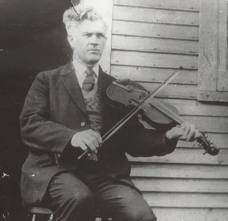Annotation:Quadrille de Beauharnois: Difference between revisions
m (Text replacement - "garamond, serif" to "sans-serif") |
No edit summary |
||
| (15 intermediate revisions by the same user not shown) | |||
| Line 1: | Line 1: | ||
---------- | |||
---- | {{TuneAnnotation | ||
|f_tune_annotation_title= https://tunearch.org/wiki/Annotation:Quadrille_de_Beauharnois > | |||
'''QUADRILLE DE BEAUHARNOIS'''. AKA and see "[[Gigue des touristes]]." French-Canadian, Jig or Quadrille. C Major. Standard tuning (fiddle). AABB. The jig if from the playing of Quebec fiddler Jospeh Allard (1873-1947), recorded for Victor in Montreal, Canada, in 1929. Allard re-recorded the tune in 1936, issued under the pseudonym "Maxime Toupin." The 'A' part of this melody resembles O'Neill's "[[Miss Blair’s Fancy]]," but there are not enough similarities to establish a direct association. | |f_annotation='''QUADRILLE DE BEAUHARNOIS'''. AKA and see "[[Gigue des touristes (1)]]." French-Canadian, Jig or Quadrille. C Major. Standard tuning (fiddle). AABB. The jig if from the playing of Quebec fiddler Jospeh Allard (1873-1947), recorded for Victor in Montreal, Canada, in June, 1929. Allard re-recorded the tune in 1936, issued under the pseudonym "Maxime Toupin." The 'A' part of this melody resembles O'Neill's "[[Miss Blair’s Fancy]]," but there are not enough similarities to establish a direct association. Allard researcher Jean Duval also compares the tune Cape Breton composer Dan R. Macdonald's "[[Chanter Jig (The)]]." As per m. Duval's comment below, compare also with "[[Lasses of Limerick (2)]]," published by John Walsh in London in 1754 (or 1756 -- dates vary), which he suggests is an ancestral melody. The first strains of the tunes are quite similar. The second strains are somewhat less so, and although there are some identical three-note sequences, the harmonic structure and the melodic contour of the last for measures of the second strain do not correspond. However, the overall similarity between the two tunes is compelling. | ||
[[File:allard.jpg|300px|thumb|left|Joseph Allard]] | [[File:allard.jpg|300px|thumb|left|Joseph Allard]] | ||
<br> | <br> | ||
<br> | <br> | ||
Beauharnois [http://en.wikipedia.org/wiki/Beauharnois,_Quebec] is a town in Quebec, now within the Greater Montreal area. | Beauharnois [http://en.wikipedia.org/wiki/Beauharnois,_Quebec] is a town in Quebec, now within the Greater Montreal area. | ||
< | <Br> | ||
<Br> | |||
The jig can be heard played by Métis fiddler Richard Callihoo on the recording "Drops of Brandy and Other Traditional Métis Tunes Disc 1" (2001) where it is titled "French Jig in C." | |||
|f_source_for_notated_version= | |||
|f_printed_sources=Cuillerier ('''Joseph Allard: Cinquante airs traditionnels pour violon'''), 1992; p. 12. Jean Duval ('''Le Musique de Joseph Allard 1873-1947'''), 2018; No. 24, p. 13. Joyal ('''Danses d'ici: Musique Traditionnelle du Québec'''), 1994; p. 11. Songer & Curley ('''Portland Collection vol. 3'''), 2015; p. 168. '''Tidal Wave Tune Book''', 2008; p. 16. | |||
|f_recorded_sources=Bluebird B-4935-a (78 RPM), Joseph Allard (1929). Great Meadow Music, "Tidal Wave/Raz de Marée" (2009). Canadian Broadcasting Corporation LM470, Eddie Poirier - "Atlantic Fiddling" (1979). Gabriel Dumont Institute, Richard Callihoo - "Drops of Brandy and Other Traditional Métis Tunes Disc 1" (2001, as "French Jig in 'C'). Philo Fl.2012, Jean Carignan – "Jean Carignan Rend Hommage À Joseph Allard" (1976). Victor 263590-A (78 RPM), Joseph Allard (1929). "Les sessions du Vices & Versa: 15e anniversaire" (2021. 2nd tune in "Set de six/huit à neuf heures!"). | |||
|f_see_also_listing=Hear Joseph Allard's 1929 recording at Virtual Gramophone [http://www.collectionscanada.gc.ca/obj/028011/f7/12657.mp3]<br> | |||
}} | |||
------------- | |||
Hear Joseph Allard's 1929 recording at Virtual Gramophone [http://www.collectionscanada.gc.ca/obj/028011/f7/12657.mp3]<br> | |||
---- | |||
Latest revision as of 03:51, 13 August 2024
X:1 T:Gigue des Touristes T:Quadrille de Beauharnois C:Joseph Allard M:6/8 L:1/8 Z:Bruce Osborne K:C e|"C"gec cBc|"G7"dBG G2 F|"C"EFG "Am"ABc|"D7"edc "G"d2 g|! "C"gec cBc|"G7"dBG G2 F|"C"EFG "F"ABc|"G7"dcB "C"c2:|! |:e|"C"gec c2 a|"F"age "C/E"c2 e|"C"gec cBc|"G7"dBG G2 g|! "C"gec c2 a|"F"age "C/E"c2 e|"C"gec "G7"BAB|"C"c3 -c2:|!
QUADRILLE DE BEAUHARNOIS. AKA and see "Gigue des touristes (1)." French-Canadian, Jig or Quadrille. C Major. Standard tuning (fiddle). AABB. The jig if from the playing of Quebec fiddler Jospeh Allard (1873-1947), recorded for Victor in Montreal, Canada, in June, 1929. Allard re-recorded the tune in 1936, issued under the pseudonym "Maxime Toupin." The 'A' part of this melody resembles O'Neill's "Miss Blair’s Fancy," but there are not enough similarities to establish a direct association. Allard researcher Jean Duval also compares the tune Cape Breton composer Dan R. Macdonald's "Chanter Jig (The)." As per m. Duval's comment below, compare also with "Lasses of Limerick (2)," published by John Walsh in London in 1754 (or 1756 -- dates vary), which he suggests is an ancestral melody. The first strains of the tunes are quite similar. The second strains are somewhat less so, and although there are some identical three-note sequences, the harmonic structure and the melodic contour of the last for measures of the second strain do not correspond. However, the overall similarity between the two tunes is compelling.

Beauharnois [1] is a town in Quebec, now within the Greater Montreal area.
The jig can be heard played by Métis fiddler Richard Callihoo on the recording "Drops of Brandy and Other Traditional Métis Tunes Disc 1" (2001) where it is titled "French Jig in C."

